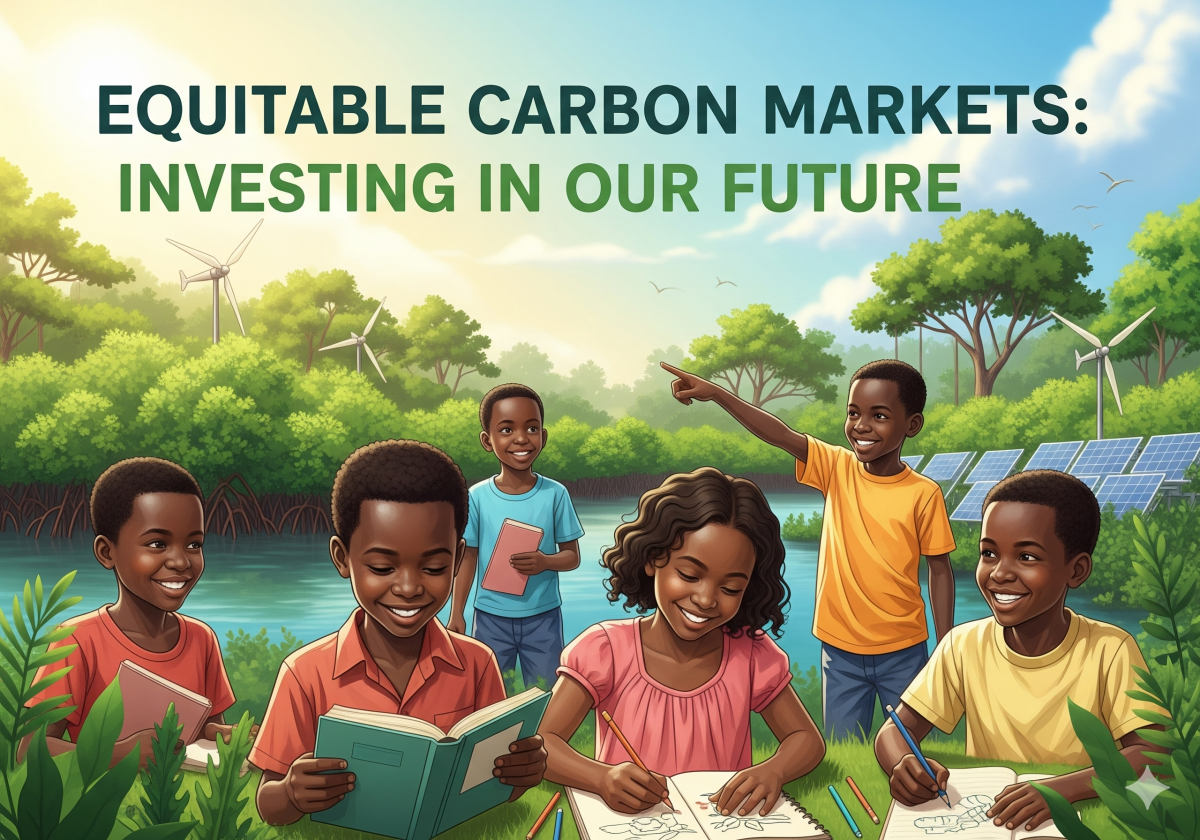Written by Jermaine Magethe
At the recent Africa Climate Pre-Summit, one message resonated above all, children and young people cannot remain on the margins of climate policy. Their voices carried urgency and clarity, reminding leaders that climate change is not a distant threat but a daily reality.
When children spoke about walking farther for water, losing farmlands to floods, or seeing their mangroves vanish, they did not use the language of carbon markets. Yet their testimonies cut to the heart of why those markets matter. Behind every ton of carbon credited or traded lies a forest that shelters families, a grassland that feeds livestock, a peatland that stores water, or a mangrove that protects coasts. For Africa, these ecosystems are not numbers on a ledger; they are classrooms, kitchens, and safety nets.
The Pre-Summit revealed that Africa holds some of the world’s most powerful natural carbon sinks, yet the communities safeguarding them often see the least benefit. Carbon markets, in their current form, risk deepening the North–South imbalance; wealthy nations purchase offsets while African communities bear the costs of conservation. Africa captures only 13.4% of voluntary carbon credits issued in 2023, despite holding ecosystems capable of sequestering over 600 million tonnes of CO₂ annually. Meanwhile, some projects have marginalized communities, ignored land rights, and delayed payments, demonstrating that the current system often extracts value rather than builds resilience.
Children at the Pre-Summit asked leaders tough questions…. Why protect forests if our schools remain unfunded? Why does the world profit from mangroves while communities struggle to survive? These are not rhetorical flourishes but calls for justice.
This is where Africa must lead differently. Reforming carbon markets cannot be about efficiency alone; it must embed equity and human-centered outcomes. Every ton of carbon saved should ripple back into communities through education, healthcare, and resilience programs. Initiatives like Kenya’s 2024 Climate Change (Carbon Markets) Regulations, which mandate that 40% of land-based project earnings go to local development, and AUDA-NEPAD’s African Integrity & Equity Principles, provide frameworks for ensuring benefits flow to those on the frontlines. Community-led projects such as Kenya’s Mikoko Pamoja where mangrove conservation revenue funds schools and clean water demonstrate that inclusive models work.
Yet not all projects have succeeded. In Tanzania, Maasai pastoralists have resisted carbon initiatives that restricted their grazing practices, locked them into decades-long contracts, and undervalued their contributions. In Uganda, farmers involved in the Trees for Global Benefit program reported long delays in payments and disproportionate impacts on women, exposing how carbon markets can unintentionally harm the very communities they aim to support. These cautionary tales underscore the urgent need for transparent governance, fair benefit-sharing, and meaningful community consent.
Africa’s climate finance gap is vast. To meet its Nationally Determined Contributions (NDCs) by 2030, the continent requires $2.8 trillion in investments, yet current annual flows amount to less than 20% of this need. Carbon markets, particularly under Article 6 of the Paris Agreement, could unlock over $250 billion annually by the end of the decade. Properly structured, these markets can catalyze private investment, industrial development, and green growth while ensuring that local communities and children benefit directly.
Children’s voices at the Pre-Summit remind us that carbon finance is more than numbers;it is a question of justice, dignity, and survival. They show that effective carbon markets must integrate social dividends such as schools, healthcare, and livelihoods alongside emissions reductions. They demand that Africa’s forests, peatlands, grasslands, and mangroves are protected not only for the global climate but for the communities that call these ecosystems home.
As the Africa Climate Summit begins, one truth is clear: carbon markets will fail if they ignore the very people who protect the ecosystems they depend on. Africa has the opportunity to set a global precedent where children’s stories shape market design, where communities are empowered as active partners, and where natural assets are monetized ethically and equitably.
The coming years will determine whether Africa can transform carbon markets into engines of sustainable development, social justice, and climate resilience. By placing children at the center, integrating robust governance, and ensuring transparent benefit-sharing, the continent can redefine what success looks like in the global climate economy. Forests, peatlands, grasslands, and mangroves deserve more than a price tag. And so do the children whose futures depend on them.

